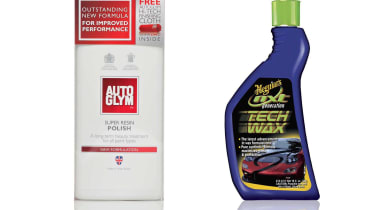Car polish - everything you need to know
There has been an explosion of new car polishes on the market in recent years. Here’s a guide to what they are for and how to use them

As any car enthusiast will know, maintaining the quality and finish of your car's paintwork is absolutely vital. Even a miniscule scuff has the potential to drive you mad, and don't even go there with door dings. Car polish is a key tool in the arsenal of anyone seeking to maintain their vehilce in tip-top condition, to preserve both its value and their own sanity, but when polishing your car you need to make sure you do the job properly.
Here we outline all you need to know about car polish, from how it works to when it should and shouldn't be used.
What is polish?
Many people don’t realise that polish is abrasive and its purpose is to remove defects. With modern cars, you’re not touching the paint at all. In fact, the polishing process removes a very small amount of the clearcoat, because it’s the clearcoat that gets damaged. A polish is designed to remove that damage, whether it be in the form of water marks, acid-rain etch, fine scratches or swirl marks.
How clean does the car have to be before polishing?
Ideally the car should be clinically clean. That means decontamination to remove tar, bug-squash and brake-dust build-up, then degreasing and then a pre-wash. These are all processes that will aid polishing and enhance the finish.
> Best car waxes – the top detailing products for your car
Do I need to do anything after I’ve used the polish?
Polishing is not a final process; you should not leave it at that because then the paint remains unprotected. Polishing is typically a preparation stage before applying either a carnauba wax or a ceramic-type sealant.
What’s the difference between a wax and a polish?
Because it is abrasive, a polish shouldn’t be used on a regular basis, only when you want to remove imperfections and in turn improve the clarity of the paint and the depth of shine. A wax, meanwhile, adds a layer of protection to maintain that gloss by preventing the likes of UV and natural contaminants from damaging the clearcoat.
How long do the results of polishing last?
It depends on what protective coating is used. For a carnauba wax you’re probably looking at two to three months depending on environmental conditions, ownership and wash routines. If you go for the expense of a ceramic sealant, that timeframe is significantly increased.
Are there any polishes to avoid?
We’d advise against the lower end of the market as some polishes contain fillers, typically chalk-based, so what you’re actually doing is filling in the problem, not correcting it.
Do you need a machine polisher?
For certain defects you don’t have to use a machine polisher – it’s an add-on to the process – but by using one you will get better results, and much faster!
Are there different polishes for machine and hand application?
A lot of the better and more refined hand polishes can also be used with a machine. However, some polishes are designed specifically to be used with a machine only. The principle behind this is that the action of the machine breaks down the abrasives into finer and finer particles. As such, they would not be suitable for hand polishing.
What about polishing classics?
You need to be more careful on a classic car that doesn’t have a clearcoat. The paint will be a lot softer, so extra caution is key.
Any last words of warning?
Watch out for SMART repairs – if they’ve not been carried out to a high standard, polishing could remove the paint. You should also be aware that there are limitations to what a polish can do – if the damage has gone through the clearcoat and the paint, you’ll need a respray.


